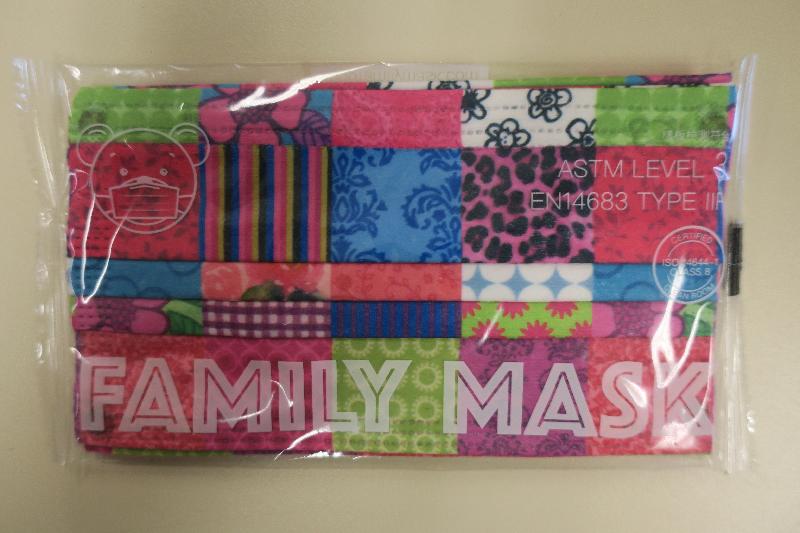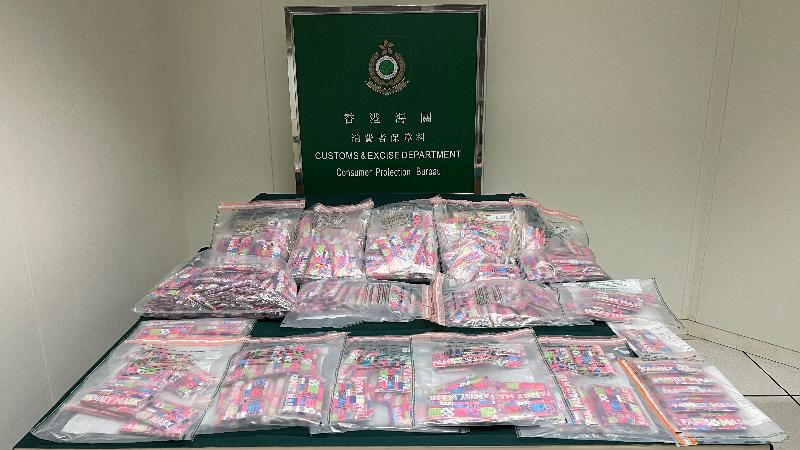Hong Kong Customs seizes coloured and patterned surgical masks with suspected excessive bacterial counts from chain cosmetics group (with photos)
Hong Kong Customs yesterday (January 27) seized 302 bags of coloured and patterned surgical masks (1 510 pieces in total), with bacterial counts found to be suspected of exceeding the maximum permitted limit, from venues under a chain cosmetics group and a related manufacturer. The masks are suspected to be in contravention of the Consumer Goods Safety Ordinance (CGSO). Customs appeals to members of the public to stop using these masks, and traders should remove the product from shelves as well. The masks seized are worth about $4,500 and two persons have been arrested so far.
In view of the increasing popularity of surgical masks with colours and patterns in the market, Customs has test-purchased over 50 samples of such masks for tests since last year. Test results revealed that all samples comply with the safety standards. Also, Customs has test-purchased 16 samples in its latest theme-based operation targeting that type of mask and conducted tests according to the related hygienic standard for disposable sanitary products. The total bacterial count of one sample was found to be exceeding the maximum permitted limit by 12.5 times, in contravention of the CGSO.
The sample was test-purchased from a chain cosmetics group's retail shop in Jordan. It was put in a five-piece bag pack and sold for $15 per pack.
Immediate action was taken upon noting the test results, by which 200 bags (1 000 pieces in total) of the masks were seized from a total of nine retail shops of the group concerned in Causeway Bay, Wan Chai, Tsim Sha Tsui, Jordan, Mong Kok and Tsing Yi yesterday.
An additional seizure of 102 bags (510 pieces in total) of the same type of masks was made on the same day from three retail shops of the Hong Kong manufacturer in Mong Kok and Lok Fu following further investigation.
A 47-year-old female manager of the chain cosmetics group and a 56-year-old male director of the manufacturer were arrested. They have been released on bail pending further investigation.
An investigation is ongoing and the likelihood of further arrests is not excluded.
An initial investigation revealed that the surgical masks involved were manufactured in Hong Kong.
Customs will further examine the masks to establish the types of bacteria present.
Apart from the retail shops of the cosmetics retailer and manufacturer connected with the case, no such product has been found for sale following checks at retail spots in various districts.
In view of the development of the COVID-19 epidemic, Customs launched a large-scale territory-wide special operation codenamed "Guardian" on January 27 last year to conduct spot checks, test purchases and inspections in various districts regarding surgical masks available in the market. Samples of masks were also sent to laboratories for tests on bacterial counts. To date, Customs has test-purchased over 760 types of surgical masks, among which 743 samples have been tested for bacterial counts.
Apart from the sample announced in this round, Customs has also announced another 12 types of surgical masks with bacterial counts suspected of exceeding the maximum permitted limit between March and December last year, of which the total bacterial counts exceeded the maximum permitted limit by 15 per cent to 22.6 times.
Customs again reminds members of the public to observe the following tips when purchasing and using surgical masks:
- Check if there is any dirt on the masks and stop using them if they have stains or odd smells;
- Avoid buying or using loose-packed surgical masks;
- Pay attention to the proper way of using surgical masks;
- Change surgical masks at a suitable time;
- Store surgical masks in dry places; and
- Purchase surgical masks at reputable retail shops.
The "Guardian" operation has been running for over a year to date. More than 6 500 officers have been mobilised to conduct over 40 000 inspections at retail spots in various districts to ensure that common protective items sold in the market comply with the CGSO and the Trade Descriptions Ordinance (TDO).
Under the CGSO, it is an offence to supply, manufacture or import consumer goods unless the goods comply with the general safety requirements for consumer goods. The maximum penalty upon conviction is a fine of $100,000 and imprisonment for one year on first conviction, and $500,000 and imprisonment for two years on subsequent convictions.
Under the TDO, any person who supplies goods with a false trade description in the course of trade or business, or is in possession of any goods for sale with a false trade description, commits an offence. The maximum penalty upon conviction is a fine of $500,000 and imprisonment for five years.
Members of the public with information relating to unsafe consumer goods may make a report via Customs' 24-hour hotline 2545 6182 or its dedicated crime-reporting email account (crimereport@customs.gov.hk).

